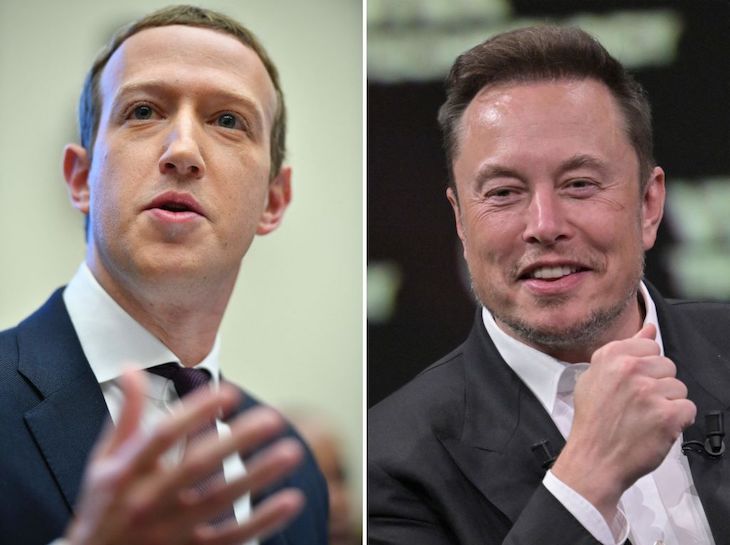Censorship and the silencing of dissenting voices has been a defining feature of the 21st century. It’s curious, because it wasn’t meant to be like this. This epoch, as the tech libertarian utopians of the 1990s so eagerly pronounced, was going to be one of unprecedented and untrammelled freedom. The internet, which burst into public consciousness back then, promised as much. Social media, which erupted a decade later, promised even more. And then it all went wrong.
I was cancelled by Facebook for writing about why men are funnier than women
We shouldn’t have been surprised. Ideologies based on utopian fantasies, underpinned by the illusion that mankind can be perfected, inevitably descend into authoritarianism. Online debate and social media became policed and muzzled, a medium through which liberal orthodoxies and then a hyper-liberal woke creed was imposed and enforced, abetted by mobs who sought to punish dissenters and heretics. Facebook and Twitter became places where you spoke freely at your peril about race, gender, immigration and Covid vaccines. They evolved into forums where uncomfortable truths and unorthodox views were as much suppressed as disseminated, with users cancelled and accounts suspended.
So while Mark Zuckerberg’s belated and somewhat expedient statement this week, regarding the decision to relax restrictions on his social media platforms, is welcome, he is being disingenuous in citing one motive: that ‘the legacy media have pushed to censor more and more.’
Zuckerberg repeats a persistent trope found on social media over the years. This is that the ‘legacy’ or ‘mainstream’ media these days are ossified agents of conformity, and that it’s online where you’ll find unfiltered truths and opinions that these dinosaurs dare not print or broadcast.
This is a myth. It was foremost the Times, and its journalist Andrew Norfolk, who invested time, money and energy into investigating and exposing the rape gangs in the north of England in the first years of this century, against the nervous consensus of the time. Alice Thomson of the Daily Telegraph and now of the Times did similar in interviewing the victims.
From its very inception, the free press has aspired and served to hold to account those in power, and in recent years the ‘mainstream media’ has been instrumental in uncovering uncomfortable truths. Just a couple of examples: it was the Daily Telegraph that broke the MPs expenses scandal in 2009; and it was the same newspaper that in 2023 released Matt Hancock’s appalling WhatsApp messages during the lockdown era.
As for the presumption that the ‘legacy media’ is irredeemably conformist and that social media is where truth and dangerous opinion abound unfettered, this is also not true, as anyone who digests and straddles both mediums knows.
The likes of Jeremy Clarkson and Rod Liddle have for decades been penning opinions that would have had alarm bells ringing had they been made solely on social media, uttered by your man in the street who had no-one to defend him.
Going back further, even more outrageous fare from Auberon Waugh or Michael Wharton (‘Peter Simple’) in the Daily Telegraph would have been unquestionably cancelled by the social media invigilators and puritan activists.
Even I have been cancelled by Facebook, for writing a piece here on why men are funnier than women. That article was removed by Facebook because it apparently ‘violated (the site’s) standards on hate speech’. A tiny incident, I grant you, but it represents a pattern: social media often censors that which the legacy media does dare to put out.
Charlie Peters of GB News, whose Oldham papers recently reignited the debate over the rape gangs, has given full credit to Andrew Norfolk. This is right and proper, yet somewhat ironic, too, given that Peters is a diligent and industrious reporter very much of the old school. And as much as his station likes to present itself as an alternative to the ‘mainstream’, it has become mainstream itself, as its ever-increasing viewing figures attest. GB News is a television and radio station, after all, one that even devotes an hour each night to reviewing tomorrow’s dead tree press.
Many have pointed out that Zuckerberg is doing with Facebook merely what Elon Musk did with Twitter. But both, in turn, are moving towards a model that television has employed for decades and the press have done for centuries: putting out news and opinion even if it upsets people, and apologising or allowing the right of reply if these words prove to be untrue. Long before ‘community notes’ ever existed, publications had ‘Corrections and Clarifications’, ‘Feedback’, and ‘Letters to the Editor’.
The decision by Facebook, and that by Twitter/X before it, to update its position on freedom of speech and truth – accepting that the former is essential for a liberal society and that the latter is held provisionally and open to revision and correction – represents not so much a response to the ‘mainstream media.’ Rather, it’s a tacit acceptance of the norms upheld for years by the mainstream media.







Comments